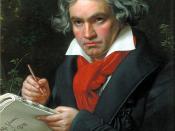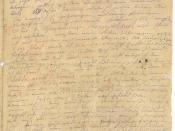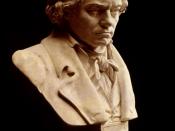The rise of Ludwig van Beethoven into the ranks of history's greatest composers was paralleled by and in some ways a consequence of his own personal tragedy and despair. Beginning in the late 1790's, the increasing buzzing and humming in his ears sent Beethoven into a panic, searching for a cure from doctor to doctor. By October 1802 he had written the Heiligenstadt Testament confessing the certainty of his growing deafness, his consequent despair, and suicidal considerations. Yet, despite the personal tragedy caused by the "infirmity in the one sense which ought to be more perfect in [him] than in others, a sense which [he] once possessed in the highest perfection, a perfection such as few in [his] profession enjoy," it also served as a motivating force in that it challenged him to try and conquer the fate that was handed him. He would not surrender to that "jealous demon, my wretched health" before proving to himself and the world the extent of his skill.
Thus, faced with such great impending loss, Beethoven, keeping faith in his art and ability, states in his Heiligenstadt Testament a promise of his greatness yet to be proven in the development of his heroic style.
By about 1800, Beethoven was mastering the Viennese High- Classic style. Although Mozart had first perfected the style, Beethoven did extend it to some degree. He had unprecedently composed sonatas for the cello, which in combination with the piano opened the era of the Classic- Romantic cello sonata. In addition, his sonatas for violin and piano became the cornerstone of the sonata duo repertory. His experimentation with additions to the standard forms likewise made it apparent that he had reached the limits of the high- Classic style. Having displayed the extended range of his piano writing he was also...



Not bad
Good work. you brought up some very interesting points.
1 out of 1 people found this comment useful.